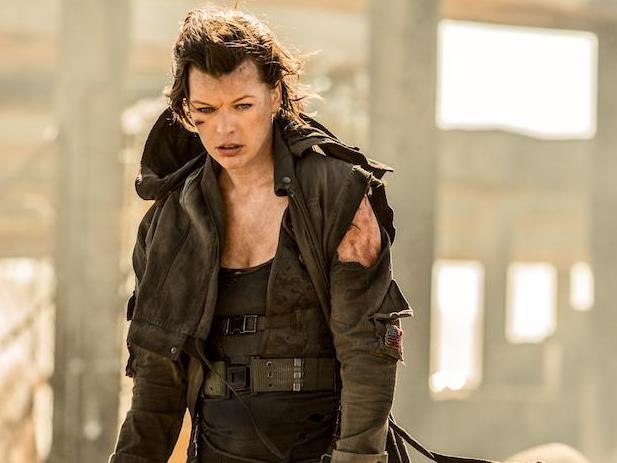In crafting cinematic stories, editing is crucial — and, it should tell a tale. The art of splicing and joining frames should stitch one image to the next, creating a moment. It should then knit more together, fashioning scenes and sequences. In the best hands, editing controls the narrative and sets the tone, while also making its very existence — its mission to insert sometimes pronounced, sometimes subtle seams — appear seamless. Barely letting 24 frames (or a second’s worth in common film projection standards) pass without cutting to the next, Resident Evil: The Final Chapter throws this idea out of the window, much to its detriment.
Taking the helm of the sixth instalment in the video game-to-screen Resident Evil franchise he first oversaw in 2002, marking his fourth time in the director’s chair but maintaining an unbroken run of writing the entire series’ scripts, filmmaker Paul W.S. Anderson (Pompeii) predicates what is being marketed as the last feature in the saga upon one belief: that jumping hurriedly from one image to the next can distract from, or even compensate for, a flimsy storyline. Alas, despite editor Doobie White’s (Momentum) best efforts in making the film’s cuts as overt and noticeable as possible, it can’t achieve that task. The frenzied visual assault, which is frequently bathed in darkness by regular Anderson cinematographer Glen MacPherson (The Three Musketeers), only sheds more light on Resident Evil: The Final Chapter’s many struggles.
Unfortunately for irrepressible heroine Alice (Milla Jovovich, Zoolander 2), those troubles start as soon as the perfunctory but necessary prologue concludes, as she dispenses with a zombie in a desolate, derelict, sun-parched Washington D.C. Since its release in the first movie, the T-virus has become an apocalyptic force, with Alice ranking among the only 4472 humans that now remain. After receiving an uncharacteristic message of assistance from Umbrella Corporation artificial intelligence system The Red Queen (debutant Ever Anderson), she sets forth for their headquarters beneath Raccoon City. Her mission, which comes with a 48-hour deadline and often plays out with more than a few nods to Mad Max: Fury Road: find an airborne antivirus that can save the last survivors from extinction.
Alongside demonstrating destructive over-editing tendencies, Resident Evil: The Final Chapter largely answers two questions: How many times can the term “airborne antivirus” roll off the tongue of the film’s characters? And, how often can the surrounding dialogue spell out the plot? Both queries exemplify a feature that dare not take a moment’s pause, nor allow viewers to step back from the close-framed action, nor ponder anything it presents for even a second. Instead, it proves content to return its protagonist to her starting point, working her way through level-like obstacles involving the undead, ravenous dogs, enclosing walls, trapdoors and twists, while also throwing a few familiar faces — Ali Larter’s (The Diabolical) Claire Redfield, last seen in fourth effort Resident Evil: Afterlife; and Iain Glen’s (TV’s Game of Thrones) Dr. Isaacs, resurrected from the third film, Resident Evil: Extinction — into the mix.
The never-say-die determination that Jovovich brings to what has become her defining role has always been the most satisfying aspect of every Resident Evil incarnation, and Anderson knows it. As well as offering an apparent — but unlikely, realistically — swansong for the series, Resident Evil: The Final Chapter is once more a showcase for its leading lady, with the latter taking precedence over the former. Still, stranded in a sea of quick, tight shots that further dampen the saga’s lack of genuine interest in character development, Jovovich’s Alice wears a distinctive sense of weariness as she battles her former employer and attempts to stop the zombie plague again. That’s understandable; both the actress and her most famous on-screen persona have stretched their quests far beyond engaging bounds, and viewer patience for chaotic cinema that is the Resident Evil franchise with it.
Rating: 1 ½ stars out of 5
Resident Evil: The Final Chapter
Director: Paul W.S. Anderson
France | Germany | Canada | Australia, 2016, 106 mins
Release date: 26 January
Distributor: Sony
Rated: MA
Actors:
Director:
Format:
Country:
Release:





